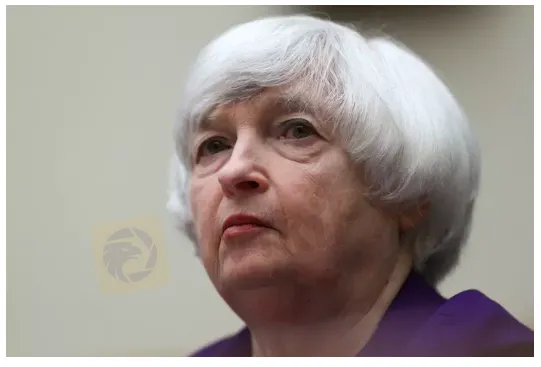简体中文
繁體中文
English
Pусский
日本語
ภาษาไทย
Tiếng Việt
Bahasa Indonesia
Español
हिन्दी
Filippiiniläinen
Français
Deutsch
Português
Türkçe
한국어
العربية
U.S. Treasury‘s Yellen, White House say World Bank needs major ’reboot
Abstract:U.S. Treasury Secretary Janet Yellen said on Thursday that the International Monetary Fund and World Bank were not designed to handle the multiple crises they are now dealing with, including the fallout from Russias war in Ukraine and the COVID-19 pandemic.

-U.S. Treasury Secretary Janet Yellen and a top White House adviser called for major reforms at the World Bank on Thursday, saying the seven-decade-old multilateral development bank was not built to address multiple and overlapping global crises.
Yellen told reporters that both the World Bank and the International Monetary Fund were not designed to handle the multiple global crises they now face, including fallout from Russias war in Ukraine and the COVID-19 pandemic, and they lack the resources to tackle climate change.
Yellen said the IMF, which has about $1 trillion in total lending resources, was intended to help individual countries deal with isolated crises, while the World Bank was created to finance development projects in countries that lacked access to capital markets.
“We face challenges that will now require investment on a scale that an international institution cant manage on its own, like climate change,” Yellen said. “The investments for climate change will add up to just trillions and trillions of dollars.”
She said she could not say what reforms are needed to scale up the institutions, but she added that they needed to be able to harness large pools of private capital.
The World Banks lending totaled $99 billion in fiscal 2021.
The institutions also need to be better capable of delivering “public goods” such as improved public health infrastructure to handle future pandemics, which may require alterations to the World Banks mandate.
In separate remarks, Deputy National Security Adviser Daleep Singh said he was in “full throated agreement” with Yellen, and believed the banks business model – which puts a premium on maintaining a AAA credit rating – was not well-suited to catalyzing global change.
“Its really past time to reimagine, and reboot the mission and the business model of the World Bank,” Singh told an event hosted by the Bretton Woods Committee.
RATINGS ‘FETISH’
The comments come amid growing calls by civil society groups, developing countries and academics for a new “Bretton Woods,” a reference to the conference held in 1941 that led to the creation of the IMF and the World Bank.
“I think the bank has made a fetish out of its triple-A rating over the course of many years,” Singh said, citing studies that showed a small downgrade in the banks credit rating could triple its lending capacity or more.
Shifting its stance would allow the bank to more risk appetite and become more of a “first mover” in terms of investments in the developing world, Singh said.
The bank could take on “first loss positions” that could potentially motivate private sector investors to come in and expand the pool of resources available for climate finance or health security into the trillions of dollars needed.
“That‘s what’s going to be needed to hit the Paris goals when it comes to climate, both on emissions reduction and adaptation,” Singh said.
He said the World Bank also needed to “get a lot louder” about the need for debt restructuring for low-income countries, given that 60% are in or near debt distress.
“Were going to need China in particular, but also the private sector, to step up and take burden sharing seriously through the common framework,” he said, referring to the G20 framework agreed with the Paris Club of official creditors.

Disclaimer:
The views in this article only represent the author's personal views, and do not constitute investment advice on this platform. This platform does not guarantee the accuracy, completeness and timeliness of the information in the article, and will not be liable for any loss caused by the use of or reliance on the information in the article.
Read more

The Hidden Checklist: Five Unconventional Steps to Vet Your Broker
Forex broker scams continue to evolve, employing new tactics to appear credible and mislead unsuspecting traders. Identifying these fraudulent schemes requires vigilance and strategies beyond the usual advice. Here are five effective methods to help traders assess the legitimacy of a forex broker and avoid potential pitfalls.

Doo Financial Obtains Licenses in BVI and Cayman Islands
Doo Financial, a subsidiary of Singapore-based Doo Group, has expanded its regulatory footprint by securing new offshore licenses from the British Virgin Islands Financial Services Commission (BVI FSC) and the Cayman Islands Monetary Authority (CIMA).

CFI’s New Initiative Aims to Promote Transparency in Trading
A new programme has been launched by CFI to address the growing need for transparency and awareness in online trading. Named “Trading Transparency+: Empowering Awareness and Clarity in Trading,” the initiative seeks to combat misinformation and equip individuals with resources to evaluate whether trading aligns with their financial goals and circumstances.

Malaysian-Thai Fraud Syndicate Dismantled, Millions in Losses Reported
The Royal Malaysia Police (PDRM) has received 26 reports concerning the Nicshare and CommonApps investment schemes, both linked to a major fraudulent syndicate led by a Malaysian citizen. The syndicate’s activities came to light following the arrest of its leader by Thai authorities on 16 December.
WikiFX Broker
Latest News
Top 10 Trading Indicators Every Forex Trader Should Know
ASIC Sues Binance Australia Derivatives for Misclassifying Retail Clients
WikiFX Review: Is FxPro Reliable?
Malaysian-Thai Fraud Syndicate Dismantled, Millions in Losses Reported
Trading frauds topped the list of scams in India- Report Reveals
YAMARKETS' Jingle Bells Christmas Offer!
AIMS Broker Review
The Hidden Checklist: Five Unconventional Steps to Vet Your Broker
Revolut Leads UK Neobanks in the Digital Banking Revolution
Fusion Markets: Safe Choice or Scam to Avoid?
Currency Calculator


